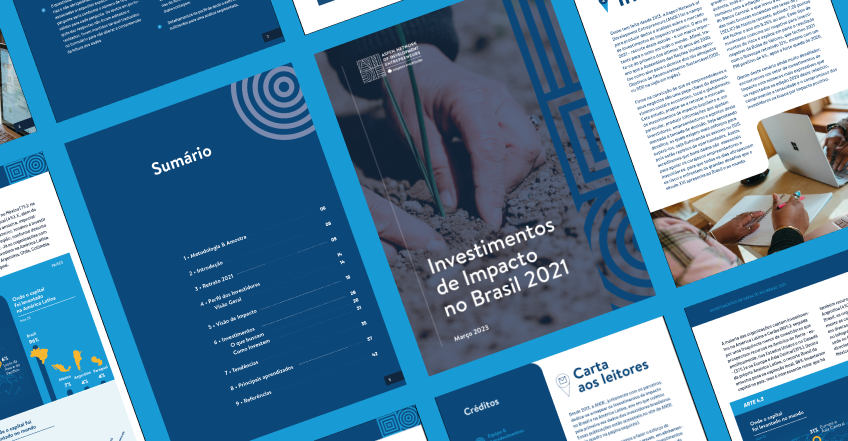
The report provides an overview of the sector in 2021. It is a tool for analyzing the context and making decisions for collective action in the impact investment market in Brazil, which is now estimated to be worth R$18.7 billion.
The Aspen Network of Development Entrepreneurs (ANDE), a global network of more than 220 organizations that propel entrepreneurship in emerging markets, has released its 2021 Impact Investing in Brazil Report. This is the fourth report focused on Brazil and it was produced through a strategic partnership with Fundo Vale, the Boticário Foundation for Nature Protection and Potencia Ventures. Analysis was performed by Pipe Labo.
At the launch event, held on May 17, Liz Lacerda of Fundo Vale’s Partnerships and Business Promotion team took part in a panel discussion called “Impact Investing, Climate and Biodiversity.”
The report provides an up-to-date snapshot of the impact investing market, based on conversations with 38 organizations that invest in Brazil.
“Using institutional and enterprise data shared by investors, this report provides an overview of where and how capital is allocated, as well as identifying the challenges faced by the impact ecosystem. This makes it an important tool to analyze the context and make decisions for collective action in this field,” says Henrique Bussacos, ANDE Brasil’s chairman.
According to the survey, in 2021, an increase in the volume of investment and the arrival of new actors in the sector were both observed. The impact investing market in Brazil has continued to grow and assets under management are now estimated to amount to approximately R$18.7 billion, up 60% from R$11.5 billion in the December 2020 survey.
Regarding the relevance of this type of research, Patricia Daros, the director of Fundo Vale, states, “Our focus is on impact businesses on the forest and climate agenda. We understand the importance of allocating resources to strengthen these businesses and the ecosystem around them, and to have financial vehicles that can invest in them. However, to better understand developments in this field, where investment gaps are and where philanthropic resources can make a difference, the constant production of knowledge is fundamental. Supporting studies like this one is a way to do this.”
When data collection began, in 2021, the COVID-19 pandemic was still in full swing and the report provides some information on how this context influenced the sector’s interests. It also underscores how diversity is still a complex topic, as more than a third of respondent investors failed to provide information on the gender and race of their board members or leaders.
In this regard, Itali Colini of Potencia Ventures says, “In analyzing the data, we saw increased interest in topics such as poverty, decent work and education. Investors are responding to the deep consequences of the pandemic, such as unemployment, employment downgrading and difficulties in accessing digitalization. On the other hand, we can also see that decision makers are still predominantly white and male. Demography shows us that diversity is an urgent matter!”
The report also indicates that investors are particularly interested in four sectors:
- Food and Agriculture;
- Education;
- Health;
- Biodiversity and Conservation of Ecosystems.
“There is a lot of interest in biodiversity among investors, but little investment has yet been made in businesses in this sector. This underlines the importance of investment by the philanthropic sector aimed at strengthening and preparing businesses in less mature areas so that they will gradually have a greater chance of attracting profit-seeking investments,” says Guilherme Karam, the Boticário Foundation for Nature Protection’s biodiversity economy manager.
Main conclusions of ANDE’s report:
- General facts:
– Around 40% of traditional investors said they had more than R$100 million under management in 2021.
– Information on 319 businesses was reported in 2021.
– Regarding expectations of returns, 24 investors said they were seeking market returns on their investments, while 11 said they were aiming for below-market returns.
- Sector’s growth: There was significant growth in assets under management mapped by this survey in relation to the previous edition, which was based on 2020 market data. The group of traditional investors had R$11 billion of assets under management, up nearly 150% from R$4.4 billion in the previous survey.
- New investment profiles: More investors are entering the pre-seed and mature private enterprise stages compared to the previous survey. This indicates greater diversification in the sector.
- Climate change: Between 2020 and 2021, 71% of investors had at least one investment in an impact business aimed at the challenges of climate change. Furthermore, 26% of investors said that climate change-related businesses accounted for all their impact business investments.
- Impacts: The two main UN Sustainable Development Goals prioritized by investors are “Decent Work and Economic Growth” and “No Poverty.” However, measuring the impacts of initiatives is still a challenge.
- Diversity: Of the 250 board members mentioned, 167 are men and 83 are women. Of 240 senior leaders, 169 are men and 71 are women. The data on race or skin color is more challenging. Among the organizations that reported data on this topic, there was a very high concentration of white board members, given that only 3 of the total reported, 162, were of other races or colors.
